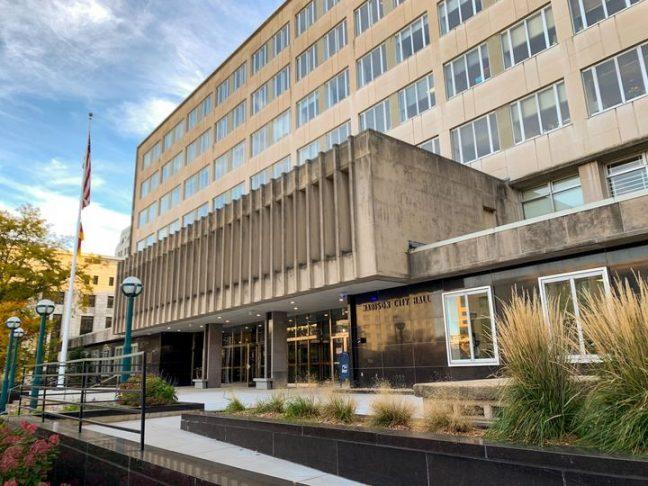Local law enforcement officials implemented new safety measures in jails and policing to protect officers and inmates from the growing COVID-19 pandemic in Dane County.
Law enforcement officials in Dane County and Madison are tackling new challenges arising from mounting cases in the area as well as within the criminal justice system. The Dane County Sheriff’s Office reported three inmates and five deputies testing positive for COVID-19 since late March, according to press releases emailed to The Badger Herald.
“Any other deputies who may have been exposed to the individuals that tested positive are being monitored closely for any symptoms related to COVID-19,” the press release stated. “It appears the common thread is both the deputies and inmates who have tested positive were either housed or working on 6 West and 7 West of the City-County Building.”
Dane County Sheriff Dave Mahoney said nine inmates in the jails and 11 other staff members reported high fevers, resulting in either isolation or testing for COVID-19. While the other tests administered came back negative, Mahoney said restrictive measures put in place are designed to halt the spread of the virus.
By suspending work release and visitation for inmates, Mahoney said the opportunities for the virus to enter or leave the Dane County Jail are limited. Staff members are also using UV Skytron emitters to sanitize and kill bacteria in high density areas of the DCJ around the clock, according to Mahoney.
“To date, we believe [disinfecting] has had a significant role in preventing the spread of COVID-19,” Mahoney said. “We’ve isolated individuals who contracted the virus to one housing unit, and that’s consistent with both the inmate population who contracted the virus and the staff that worked that housing unit at the time of onset.”
The Dane County Sheriff’s Office is working actively to reduce the risk of COVID-19 by spreading individuals out between three DCJ facilities, Mahoney said. Due to the infrastructure of the current jail, Mahoney said it is very difficult to maintain social distancing in the small space available.
To combat this, the Dane County Sheriff’s Office also managed to lower the overall inmate population in the jails, Mahoney said. According to a news release emailed to the Badger Herald April 6, the number of inmates was reduced to 466 individuals— 279 less inmates in the DCJ system than early March. This population is down even more from the usual occupancy in the high 700s, according to Mahoney.
“This was accomplished by working with our local law enforcement to find other options to booking individuals into jail without jeopardizing public safety, and by using other discretionary methods which have worked successfully to date,” Mahoney said.
Dane County judges and district attorneys worked with the DCJ to use discretionary measures on charging and sentencing decisions to help limit the number of inmates in the DCJ facilities, according to Mahoney.
Though, the Department of Corrections made the biggest contribution to the significant drop in inmates housed in DCJ facilities, Mahoney said. The DOC is actively identifying inmates in the DCJ for probation or parole violations who could safely be released or monitored by GPS tracking, according to Mahoney.
“The number of individuals who are sitting in jail under DOC control for probation violations … has almost dropped entirely in half,” Mahoney said.
As for protecting law enforcement officials, Mahoney said deputies received Personal Protection Equipment to place a barrier between them and individuals they encounter on patrol. Mahoney said for staff members with other concerns or pre-existing conditions, the Dane County Sheriff’s Office is working to provide other social distancing options.
Madison Police Department Public Information Officer Joel DeSpain said MPD is also providing PPE to officers. According to MPD Chief Victor Wahl’s blog, this equipment includes masks, gowns, gloves and eye protection. The MPD has a special COVID-19 task force that deals with other matters surrounding COVID-19 to ensure officers are safe, according to DeSpain.
“If our officers do come in contact with anyone who could potentially be COVID-19 positive, our task force deals with the squad cars and other items that could potentially be infected,” Despain said. “They’re doing a really good job of keeping those squad cars on the road after thoroughly cleaning them.”
While MPD has no cases so far, DeSpain said it’s highly likely for officers to come in contact with someone who is positive. People making calls who require immediate assistance will come in contact with officers, according to DeSpain.
Gov. Tony Evers signed an executive order April 2 allowing first responders to have access to address information about individuals diagnosed with COVID-19. The order allows first responders to have discretion on how best to operate during the pandemic.
“[The executive order] will assist us in responding to calls for service, from a law enforcement perspective, more efficiently and doing so in a fashion that protects all the first responders,” Mahoney said.
While Evers’ executive orders affect day-to-day operations, both DeSpain and Mahoney said so far neither agency had to force individuals to comply with the orders. Even for businesses or gatherings deemed nonessential, DeSpain said individuals cooperated.
Mahoney said much like medical professions, law enforcement officers must continue to be out in the community and remain exposed to the virus. Through widespread voluntary compliance, Mahoney said he is proud of how the community responded thus far, but remains cautious.
“I think as time goes by and people become more desirous to get out of their homes and out of isolation, we increase the chance of spreading the virus,” Mahoney said. “I hope we continue to enjoy the level of voluntary compliance without having to force law enforcement and other first responders to take more aggressive action to enforce the governor’s orders.”


